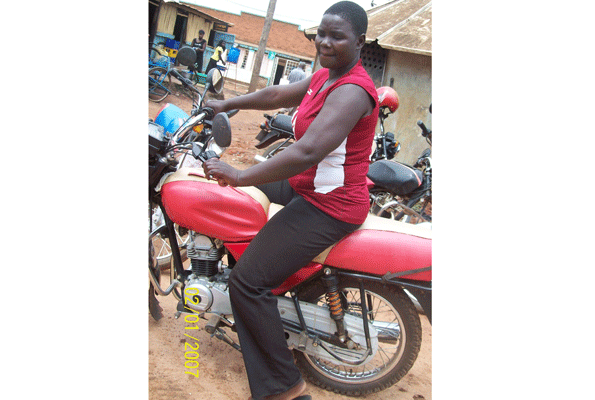Female boda boda rider finds her place among men

Aber has built a loyal customer base for her boda boda services especially among the women who trust her skills on the motorcycle and the discipline she has when taking them to their destinations. Photo by Cissy Makumbi.
What you need to know:
Circumstances made her venture into a male-dominated field, where she endured resistance from men and ridicule from women to find her place in it.
"Customer, can I take you?” From her boda boda stage in Layibi centre, Gulu, 25-year-old Diana Aber welcomes me with a smile. In the midday hustle and bustle of the town, she stands out from the pack. This mother of not one, but two sets of twins is poised to defy the odds.
Aber has been riding a boda boda for the last five years. She says she has no regrets though it was a struggle at first.
Her husband abandoned her when she gave birth to her second set of twins, saying bearing many sets of twins was a curse in their family. So, she began to look for a way to fend for her family single-handedly.
“I had no capital and even if I had it, my children were still too young to be left at home alone,” she recalls. “That’s why I opted for a boda business, whereby I can get some time to get home and check on them.”
Balancing home and work
At the beginning, members of the community mocked and ridiculed her. “Fellow women would call me prostitute, not knowing that with all the responsibility I had, I could not sit at home and wait for any man to propose marriage,” Aber said. “But time came and they had to swallow their words after they realised that I was in the business so that I can be able to raise my children.”
Apart from that, the male boda boda riders were not happy about her joining them. However, with time they came around after finding out she is a single mother who is struggling on her own.
They have even become protective of her. On the days when she fails to turn up for work, they always call to find out if she is okay. “And if the day has been ‘dry’, the customers who come around are given to me, especially the women who feel comfortable being carried by a fellow woman,” she says.
Aber’s day begins with preparing her twins, aged seven and nine, for school. She then begins her workday at 8am, but goes back home to prepare lunch at midday. In the evening, she always stops work at around 7pm so she can be with them at home.
She says she now has a loyal regular customer base, both women and men, who know her as a diligent and responsible rider: “I have customers because of how careful I am.”
Though she has managed to make ends meet—she earns between Shs20,000 and Shs35,000 per day—she gives Shs50,000 to the owner of the motorcycle every week.
According to Panaleo Anywar, chairperson of the Gulu United Boda Boda Association, most boda boda riders in Gulu are now taking out loans so they can save more of their earnings. “The majority get motorcycles on loans to the tune of Shs3.9m,” he said.
Anywar says there are four female boda boda riders out of 4,500 in the district. These women have fought to gain the respect of their clients and fellow riders. Three of them are single mothers doing it to support their children. All of them are known for doing their work diligently and providing for themselves.
“These women have been able to improve their livelihoods through riding boda bodas,” he added. Though he cautions them on riding at night, as women are more likely to be targets for thieves, he recognises that these women have proven themselves more than able to do what has traditionally been seen as a man’s job.
Change in roles
But the job is always full of risks. “If the motorcycles are stolen, the association faces the challenge of paying the loan back.”
This year alone over 30 motorcycles have been stolen from the riders, and two riders lost their lives. The association says it helps its members or their dependents especially in such case of accidents or death.
Aber is all too aware of those risks, and says she will not always be in the business. “I am still planning to get a piece of land and have a permanent structure,” she talks about her future plans.
She also plans to own a boda boda, so that she can hire someone else to work for her while she concentrates on raising her children. But until then, she sees no difference between her and the next boda rider.
“Days are gone when some jobs were specifically for men,” she asserts. “Men were entitled to fend for their families in African traditional setting but nowadays the trend has changed. Women can still do the same job as men, so long as they can have something to help their families improve on their lives.”




